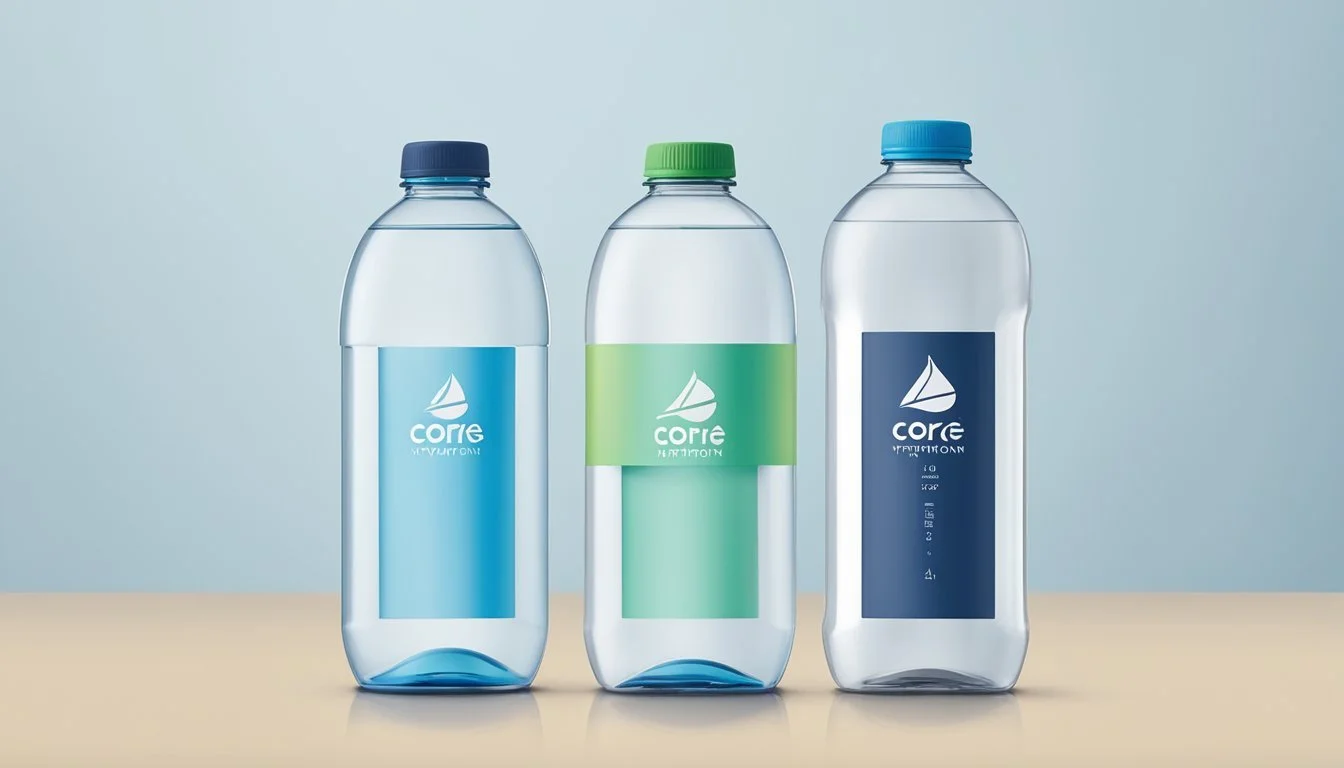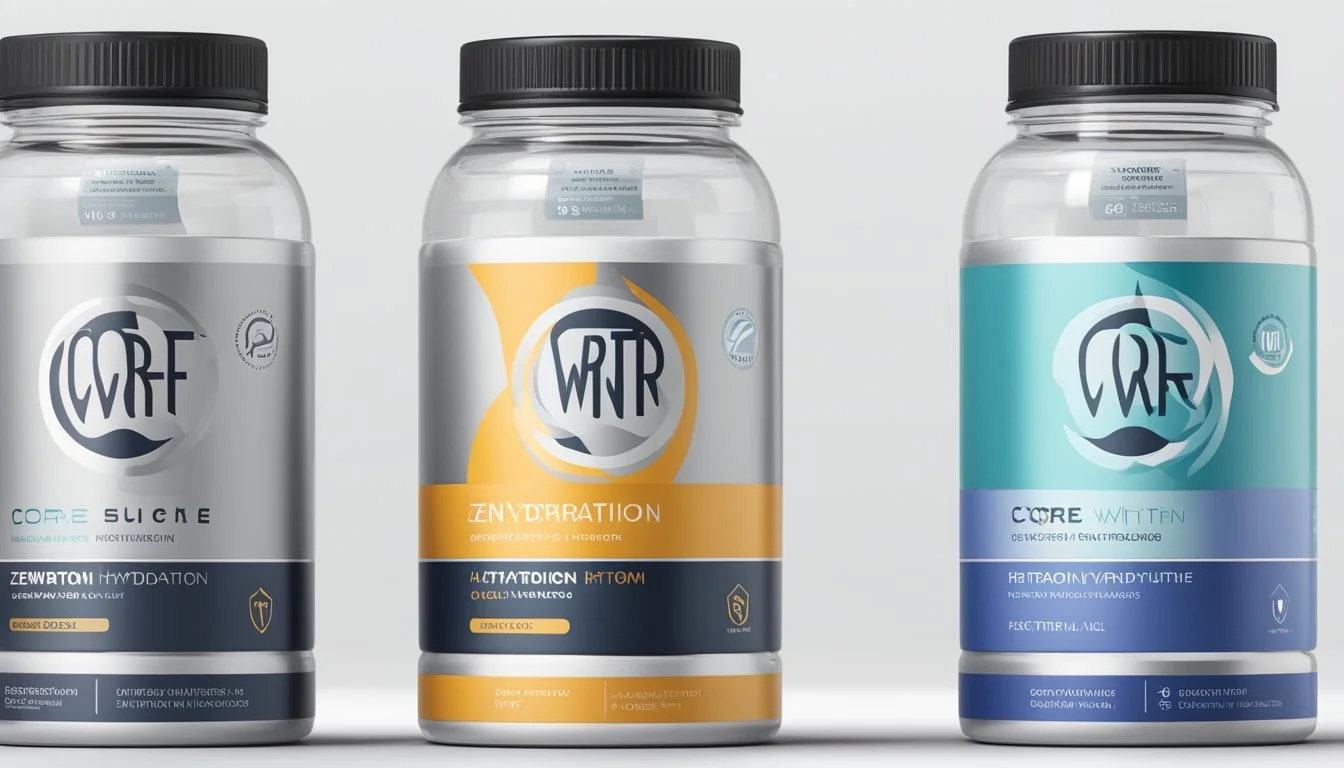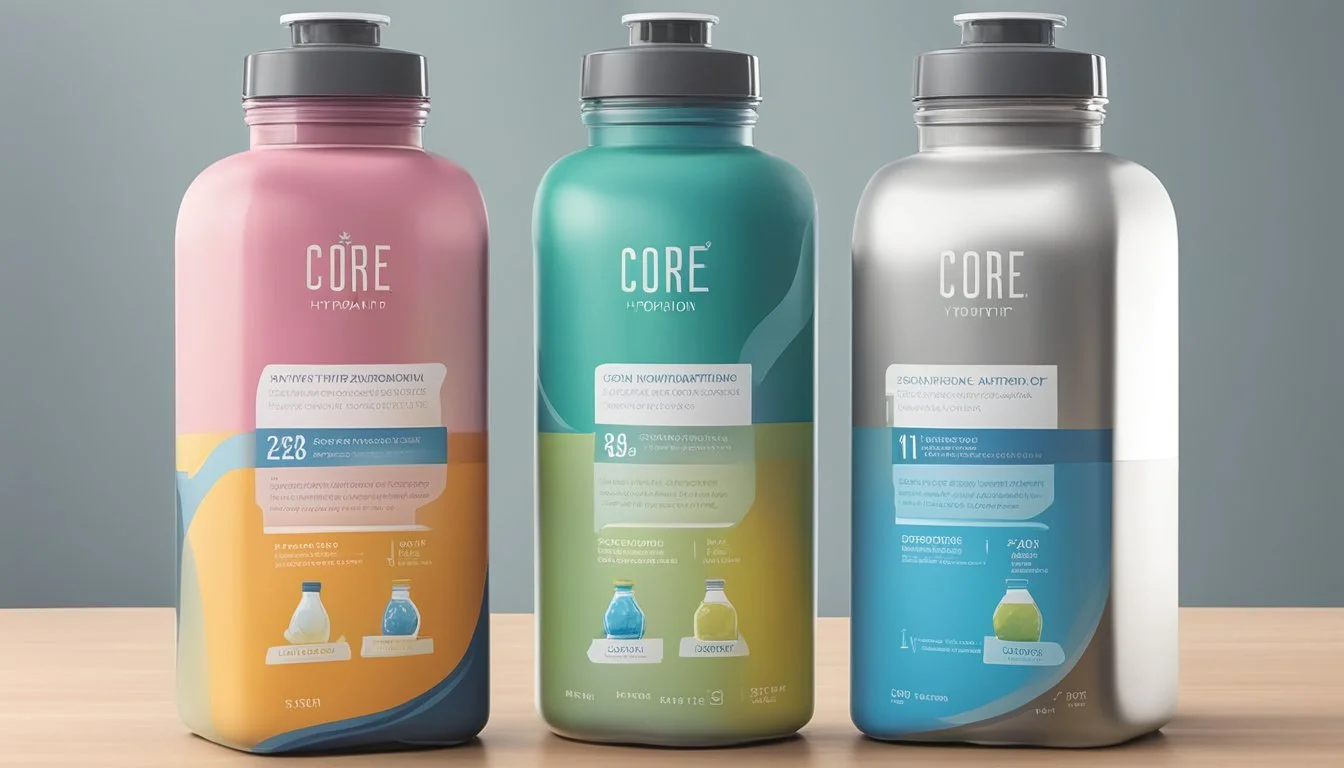Core Hydration vs. Zenwtr
Comparing Premium Bottled Waters
For those who prioritize hydration and sustainability, the debate between Core Hydration and ZenWTR is significant. Core Hydration promotes its ultra-purified water, which features a pH level that aligns with the human body's natural state, complemented with electrolytes and minerals for balanced taste. It's a premium option, typically priced between $2.00 to $3.00 for a 30.4 fluid ounce bottle, catering to those who desire high-quality hydration.
In contrast, ZenWTR offers a high pH of 9.5, positioning itself as an alkaline water choice loaded with environmental benefits. ZenWTR's bottles are made from 100% recycled ocean-bound plastic, which appeals to eco-conscious consumers seeking to make a positive environmental impact while staying hydrated. With its impressive environmental commitment and quality hydration, ZenWTR provides a compelling alternative for those weighing options.
Both brands target consumers who are mindful of the quality and source of their hydration. When choosing between Core Hydration and ZenWTR, it boils down to personal preference: whether one prefers the balanced taste of ultra-purified water or the high pH and sustainability stance of an eco-friendly brand. Looking deeper into what each brand offers will provide a clearer picture of which bottled water suits your needs best.
Understanding Bottled Water
When evaluating bottled water, consumers often consider the types of water available, the regulations ensuring safety and quality, and the sources from which the water is sourced.
Types of Bottled Water
Bottled water is categorized based on its source and treatment process. Natural spring water is sourced from an underground formation and flows to the surface. It undergoes minimal treatment to maintain its natural composition. Purified water is often sourced from tap water and undergoes advanced purification processes such as reverse osmosis or distillation to remove impurities. Mineral water contains naturally occurring minerals and must adhere to stringent regulations to maintain specific mineral content levels. Artesian water comes from a confined aquifer, needing special conditions to naturally rise to the surface.
Regulations and Safety Standards
The safety and quality of bottled water in the United States are regulated by the Food and Drug Administration (FDA), which establishes guidelines comparable to those set by the Environmental Protection Agency (EPA) for tap water. These regulations mandate regular testing for contaminants, adherence to safe drinking water standards, and accurate labeling. Bottled water manufacturers must comply with stringent bottling and purification processes to ensure safety, including monitoring for harmful substances such as bacteria, viruses, and chemical contaminants.
Bottled Water Sources
The source of bottled water plays a crucial role in its quality and characteristics. Common sources include natural springs, artesian wells, and public water systems. Natural springs provide water that is often rich in minerals and has a distinctive taste. Artesian wells access water from confined aquifers, which are often protected from surface contamination. Public water systems provide a reliable and consistent source, though the water undergoes extensive purification to meet bottled water standards. Each source offers unique benefits and traits, influencing consumers' preferences and choices.
By understanding these key aspects, consumers can make informed decisions when selecting bottled water that aligns with their preferences and needs.
Brand Profiles
Core Hydration and ZenWTR are both prominent names in the bottled water market. Each brand offers unique attributes that cater to different consumer preferences, focusing on nutritional content, pH level, and environmental impact.
Core Hydration: Brand Overview
Core Hydration emphasizes purity and nutritional value. The water undergoes a seven-stage purification process, including reverse osmosis. This process ensures that Core Hydration water is free from contaminants.
With a pH level of 7.4, the water is neutral, making it neither too acidic nor too alkaline. This pH level matches the body's natural pH, which aims to provide optimal hydration.
Nutritional Content: Core Hydration water is enhanced with electrolytes such as calcium, magnesium, and potassium. These electrolytes are added to improve the taste and provide additional health benefits.
Sustainability: The bottles are 100% recyclable and BPA-free, which appeals to health-conscious and environmentally-aware consumers. The design also focuses on ergonomics, offering a comfortable grip for users.
ZenWTR: Brand Overview
ZenWTR markets itself as a high-pH, alkaline water brand. With a pH level of 9.5, ZenWTR is naturally alkaline, which can be beneficial for those seeking to balance their body's acidity.
Alkalinity: The naturally high alkalinity sets ZenWTR apart from brands that use artificial additives to achieve similar pH levels.
Nutritional Content: Although specific electrolyte additions are not highlighted, the focus remains on the high pH level and its potential health benefits.
Environmental Impact: ZenWTR is deeply committed to sustainability. Its bottles are made from 100% recycled ocean-bound plastic, reducing marine pollution. This eco-friendly approach resonates strongly with environmentally-conscious consumers.
By presenting these key attributes, consumers can make informed choices based on their preferences for nutritional content, pH level, and environmental sustainability.
Health and Hydration
Core Hydration and ZenWTR both position themselves as premium options for maintaining optimal health and hydration. Key elements essential for evaluating these bottled waters include their electrolyte content, pH levels, and any additional nutritional additives present in each brand.
The Role of Electrolytes
Electrolytes are crucial for maintaining fluid balance, muscle function, and overall physical health. Core Hydration includes potassium bicarbonate, magnesium chloride, and calcium chloride, ensuring a mixture of essential minerals.
ZenWTR emphasizes natural alkalinity through its mineral content. While Core Hydration does not disclose the exact doses of its minerals, these electrolytes still play a significant role in hydration and preventing dehydration.
Impact of pH in Hydration
The pH level of water can influence taste and hydration efficiency. Core Hydration boasts a pH of 7.4, which aligns closely with the body's natural pH, providing a balanced option that’s neither too acidic nor too alkaline.
ZenWTR, with a pH of 9.5, offers a more alkaline choice. This higher pH level can help neutralize acidity in the body, potentially benefiting those seeking to balance their bodily pH levels for improved hydration and health.
Nutrition and Additives in Bottled Water
Nutritional content and additives can significantly impact the quality of bottled water. Core Hydration contains no artificial flavors or colors, focusing instead on a purified water profile enhanced with essential electrolytes.
ZenWTR similarly avoids sugars and artificial flavors, stressing its environmental benefits and commitment to providing naturally alkaline water. Both brands cater to health-conscious consumers by prioritizing purity and natural ingredient profiles, thus ensuring effective hydration without unnecessary additives.
Taste and Purity
When examining Core Hydration and ZenWTR, their taste and purity emerge as critical factors to consider. Both brands emphasize clean taste and high-quality filtration, but they differ in specific attributes.
Comparing Taste Profiles
Core Hydration aims for a balanced taste, emphasizing a perfect pH of 7.4, which is neutral to slightly alkaline. This balance helps create a smooth, clean flavor, devoid of the metallic or plastic aftertastes often found in other bottled waters. Core's taste appeals to those who prefer a subtle and neutral profile.
ZenWTR, with its pH of 9.5, offers an alkaline experience. This higher pH can result in a more refreshing and crisp taste, appealing especially to individuals who favor water with a slightly sharper finish. Taste tests often highlight ZenWTR's ability to provide a revitalizing drinking experience without any off-putting flavors. The presence of natural minerals can also enhance its unique taste profile.
Purity and Contaminant Levels
Core Hydration and ZenWTR both utilize advanced filtration processes to ensure the highest purity. Core Hydration employs a seven-stage filtration technique, including reverse osmosis and carbon filters, to remove impurities and contaminants such as heavy metals, chlorine, and fluoride. This meticulous process guarantees that what reaches your bottle is free from undesirable elements.
ZenWTR also boasts rigorous filtration, integrating a multi-step purification process that includes reverse osmosis. Additionally, ZenWTR focuses on maintaining the natural alkalinity sourced from natural springs, further enhancing its purity. This process effectively removes contaminants while preserving essential minerals, offering a clean and health-conscious product. Both brands prioritize purity, but their unique approaches to filtration and mineral content set them apart in the bottled water market.
Environmental Considerations
Both Core Hydration and ZenWTR present unique approaches to mitigating their environmental impact. ZenWTR emphasizes reducing plastic pollution, while Core Hydration focuses on balanced sustainability efforts.
Plastic Use and Pollution
ZenWTR takes a strong stance against plastic pollution by using 100% post-consumer recycled (PCR) ocean-bound plastic for their bottles. This ocean-bound plastic is collected from coastlines and waterways, preventing it from entering the oceans. By utilizing recycled materials, ZenWTR significantly reduces plastic waste and discourages production of new plastic.
Core Hydration, while not using ocean-bound plastic, incorporates recyclable plastic in its bottled water packaging. Efforts are made to ensure that the materials can be processed through standard recycling systems. However, using primarily virgin plastic still contributes to long-term plastic pollution.
Sustainability and Recycling Efforts
ZenWTR's commitment to sustainability extends beyond its products. The company partakes in initiatives aimed at reducing the carbon footprint associated with plastic production and promoting use of reusable bottles. They actively support programs dedicated to ocean conservation and pollution prevention, fostering greater environmental stewardship.
Core Hydration also makes strides in recycling efforts by encouraging consumers to participate in recycling programs and offering information on the importance of sustainable practices. Their product line aims for a balanced approach, focusing on both the recyclability of their plastics and maintaining the water's purity and pH balance.
While each brand addresses environmental concerns differently, ZenWTR places a stronger emphasis on reducing single-use plastic and promoting circular economy principles. In contrast, Core Hydration ensures its bottled water packaging remains recyclable, albeit with some reliance on virgin plastic.
Comparative Analysis
Comparing Core Hydration and ZenWTR reveals significant differences in their pH balance, packaging, and target consumer groups. These elements are essential for deciding which bottled water brand meets your needs.
Core Hydration vs. ZenWTR: A Closer Look
Core Hydration boasts a perfectly balanced pH of 7.4, which aligns with the body's natural pH level. It includes electrolytes for enhanced taste and comes in 100% recyclable, BPA-free plastic bottles. It's ideal for health-conscious consumers seeking both hydration and purity.
ZenWTR has a higher pH level of 9.5, making it alkaline. This brand positions itself as a sustainable choice, using bottles made from 100% recycled ocean-bound plastic. It appeals to environmentally conscious consumers who prioritize reducing plastic pollution and achieving clean hydration.
Market Alternatives and Competitors
In comparison to Core Hydration and ZenWTR, other bottled water brands offer a variety of features:
Smartwater offers both standard and alkaline options, with a transparent marketing approach focusing on purity and hydration.
Fiji is known for its natural artesian water and high silica content, which provides a unique taste.
Evian markets its water as natural spring water from the French Alps, rich in minerals.
Dasani and Aquafina are widely available and affordable, though they don't emphasize specialized pH levels or sustainability as strongly.
Each of these alternatives caters to different consumer preferences, from affordability to specific health benefits and environmental sustainability.
Consumer Considerations
When choosing between Core Hydration and ZenWTR, consumers should weigh their options based on factors such as pricing, accessibility, packaging, and convenience. These elements often play significant roles in beverage consumption and aligning with lifestyle choices.
Pricing and Accessibility
Core Hydration is available at a mid-range price point, making it accessible for a wide audience. It offers good value for money, especially considering its claims of balanced pH levels. Core Hydration can be found in major retail stores, as well as online marketplaces, enhancing its accessibility.
ZenWTR, positioned as a premium product, generally costs more than Core Hydration. Its higher price reflects its focus on sustainability with a pH of 9.5, boasting eco-friendly packaging. Availability of ZenWTR is slightly more limited, often stocked in specialty stores and online platforms dedicated to sustainable products.
Packaging and Convenience
Core Hydration focuses on convenience with its sleek, ergonomically-designed bottle, which is also BPA-free. This design is intended to fit comfortably in most cup holders, making it ideal for on-the-go hydration. The clear labeling ensures consumers know the benefits and contents of the water right away.
ZenWTR, acclaimed for its use of recycled plastic packaging materials, highlights its commitment to reducing plastic waste. The bottles are also BPA-free and have a modern design. Though slightly bulkier than Core Hydration's packaging, the emphasis on sustainability might appeal more to eco-conscious consumers.
Both brands ensure their packaging is designed for convenience and everyday use, aligning with different lifestyle choices and preferences.
More About Core Hydration
Acqua Panna vs Core Hydration: Which Bottled Water is Better?
Boxed Water vs Core Hydration: Which Bottled Water is Better?
Core Hydration vs Alkaline88: Which Bottled Water is Better?
Core Hydration vs Aqua Carpatica: Which Bottled Water is Better?
Core Hydration vs Cascade Mountain: Which Bottled Water is Better?
Core Hydration vs Castle Rock: Which Bottled Water is Better?
Core Hydration vs CBD Living: Which Bottled Water is Better?
Core Hydration vs Crystal Geyser: Which Bottled Water is Better?
Core Hydration vs Crystal Lake: Which Bottled Water is Better?
Core Hydration vs Essence pH10: Which Bottled Water is Better?
Core Hydration vs Hawaii Volcanic: Which Bottled Water is Better?
Core Hydration vs Hawaiian Springs: Which Bottled Water is Better?
Core Hydration vs Ice Mountain: Which Bottled Water is Better?
Core Hydration vs Icelandic Glacial: Which Bottled Water is Better?
Core Hydration vs Just Water: Which Bottled Water is Better?
Core Hydration vs Kirkland Signature: Which Bottled Water is Better?
Core Hydration vs Liquid Death: Which Bottled Water is Better?
Core Hydration vs Mountain Valley Spring Water: Which Bottled Water is Better?
Core Hydration vs Nestle Pure Life: Which Bottled Water is Better?
Core Hydration vs Open Water: Which Bottled Water is Better?
Core Hydration vs Poland Spring: Which Bottled Water is Better?
Core Hydration vs Proud Source: Which Bottled Water is Better?
Core Hydration vs Purely Sedona: Which Bottled Water is Better?
Core Hydration vs Richard's Rainwater: Which Bottled Water is Better?
Core Hydration vs San Pellegrino: Which Bottled Water is Better?
Core Hydration vs Simple Truth: Which Bottled Water is Better?
Core Hydration vs Smartwater: Which Bottled Water is Better?
Core Hydration vs Solan de Cabras: Which Bottled Water is Better?
Core Hydration vs Talking Rain AQA: Which Bottled Water is Better?
Core Hydration vs Topo Chico: Which Bottled Water is Better?
Core Hydration vs Weird Water: Which Bottled Water is Better?
Core Hydration vs Whole Foods 365: Which Bottled Water is Better?
Core Hydration vs Whole Foods Italian Still Mineral water: Which Bottled Water is Better?
Core Hydration vs Zephyrhills: Which Bottled Water is Better?




